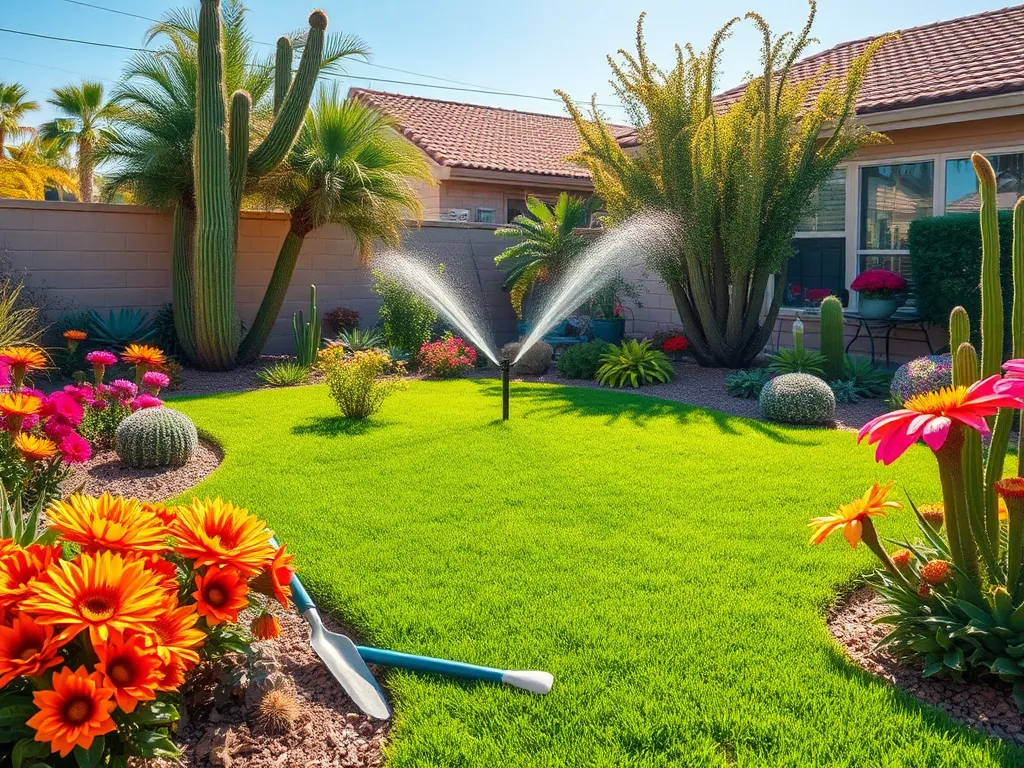Essential Seasonal Lawn Care Guide for Phoenix Homeowners

Seasonal Lawn Care for Phoenix Homeowners
Seasonal lawn care for Phoenix homeowners is essential for maintaining a lush and vibrant yard throughout the year. The unique climate of Phoenix, characterized by extreme heat in the summer and mild winters, requires a tailored approach to lawn maintenance. Understanding how to care for your lawn during each season can help homeowners achieve a beautiful outdoor space that's resilient against the harsh conditions.
In this article, we'll explore the specific needs of lawns in Phoenix through the changing seasons, providing expert tips on fertilization, watering, pest control, and more. From the vibrant blooms of spring to the dormant lawns of winter, effective seasonal lawn care strategies will ensure that your lawn remains healthy and attractive year-round. Let's dive into the various aspects of seasonal lawn care for Phoenix homeowners, focusing on the key activities needed for optimal lawn health and growth.
Gardeners located in arid areas will greatly benefit from applying these desert climate lawn tips.
As the seasons shift, so do the requirements for maintaining your lawn. Spring is a time for rejuvenation, summer demands proper hydration techniques, fall sets the stage for winter preparation, and winter brings its own unique challenges. By layering your understanding of these seasonal needs, you can create a tailored lawn care plan that keeps your outdoor space lush and inviting even in Arizona's extreme weather. This article aims to be a comprehensive guide to help Phoenix homeowners navigate their seasonal lawn care effectively.
Seasonal lawn care for Phoenix homeowners also requires awareness of common mistakes that can hinder lawn health. By recognizing issues such as overwatering, soil health neglect, and inappropriate grass type selection, homeowners can prevent damage and ensure a vibrant landscape. This in-depth examination of each seasonal phase will provide you with the knowledge and tools necessary for exceptional lawn care. Let’s take a closer look at how to care for your lawn throughout the year in Phoenix.
With this foundation, we’ll break down seasonal strategies for lawn care specific to Phoenix's environmental conditions, ensuring long-term success and health. Get ready to transform your lawn into a green oasis, regardless of the season, with the best practices tailored for the unique challenges faced by Phoenix homeowners.
For those seeking to maintain their gardens beautifully throughout all seasons, year-round lawn maintenance is crucial.
Spring Lawn Care
In spring, Phoenix homeowners should focus on establishing a lawn fertilizer schedule to ensure their grass gets the nutrients it needs for healthy growth. A good rule of thumb is to apply a slow-release fertilizer in early spring, giving your lawn a boost as temperatures begin to rise. Regular fertilization, ideally every 6-8 weeks, will provide the essential nutrients that promote vibrant, green grass.
For optimal grass types in spring growth, homeowners in Phoenix should consider warm-season grasses such as Bermuda, Zoysia, and Buffalograss. These varieties thrive in the hotter months, recovering quickly from any winter dormancy and actively growing during the springtime warmth. Selecting the right grass type can significantly impact the overall health of your lawn.
A seasonal gardening calendar is an essential tool for anyone looking to optimize their planting and harvesting times.
Best practices for watering during spring include adjusting the frequency and amount of water based on the weather conditions. In general, watering deeply once or twice a week is sufficient for establishing grass. The goal is to deliver about an inch to an inch and a half of water per week, which promotes deep root growth and drought resilience.
Controlling spring pests and diseases is crucial for a thriving lawn. Regularly examining your grass for signs of pests like aphids or grubs and treating them promptly can help prevent infestations. Additionally, keep an eye out for diseases such as brown patch, which can be managed through proper watering practices and using fungicides if necessary.
Summer Lawn Maintenance
Selecting heat-resistant grass varieties for summer is key to maintaining a healthy lawn in Phoenix's scorching temperatures. Grasses like Bermuda and Zoysia are popular choices, as they can withstand high heat and still maintain their color and density. Homeowners should also ensure their lawn remains well-aerated to support root health.
Summer irrigation tips include utilizing a schedule that caters to the extreme heat. Early morning or late evening watering is ideal to prevent evaporation loss. Drip irrigation systems can also be effective, delivering water directly to the roots and conserving water.
Handling summer weeds effectively involves regular mowing and employing pre-emergent herbicides in early summer. This prevents weed seeds from germinating while letting the grass flourish. Moreover, maintaining a healthy and thick lawn will discourage weed growth by denying them the opportunity to spread.
Signs of heat stress in lawns can include a brownish tint, wilting, and a spongy texture when walked on. To alleviate heat stress, ensure proper irrigation, avoid mowing during the hottest parts of the day, and consider shading the lawn with outdoor structures or plants to protect it from direct sunlight.
Fall Lawn Preparation
In preparation for winter, fall lawn care should focus on preparing your lawn to endure the milder months. Aeration and overseeding are critical during this season, allowing for better air circulation and nutrient absorption. Well-aerated lawns are more resilient and able to withstand the cooler temperatures.
Choosing the right grass seeds for fall overseeding involves selecting cool-season varieties that can establish before winter. Ryegrass is a great option, as it germinates quickly and provides a lush appearance while the warm-season grasses go dormant. This practice also improves the lawn's overall resilience.
Fertilizing your lawn in the fall helps strengthen grass roots before winter. A phosphorus-rich fertilizer promotes root growth and store energy, preparing your lawn to endure the challenges of colder months. It's advisable to conduct a soil test to determine which nutrients your lawn may be lacking to apply the right products.
Cleaning up leaves and debris during fall is not just for aesthetics; it also protects lawn health. Leftover debris can smother grass and encourage disease, so regular raking or mulching is essential for maintaining a clean, healthy lawn that can breathe and grow well into winter.
Winter Lawn Care
Winter survival tips for Phoenix lawns include ensuring that lawns receive adequate water during the cooler months. While grass may appear dormant, it still requires hydration. Watering every 2-3 weeks can help prevent stress and ensure a healthier lawn come spring.
The importance of winter watering cannot be overstated, especially in arid climates like Phoenix. Soil can dry out quickly, even when temperatures are low. Be sure to monitor soil moisture and adjust your watering schedule accordingly to prevent winter drought.
Preparing lawn equipment for spring is best done in winter. Now is the time to clean, sharpen, and service mowers and other equipment to ensure they are ready for action once the growing season begins. Regular maintenance will extend the life of your tools and ensure that they perform efficiently.
Understanding lawn dormancy and its signs is crucial for Phoenix homeowners. Recognizing that grass slows down growth but does not die during winter is important. Monitor for signs like color changes and wilting, and be mindful of watering needs to ensure rejuvenation in the spring.
Common Lawn Care Mistakes
Overwatering can be a major issue for Phoenix lawns. Many homeowners mistakenly think that more water means healthier grass. In reality, excessive moisture can drown roots and lead to fungus growth. It’s crucial to stick to a watering schedule that meets the lawn's actual needs without going overboard.
Ignoring soil health can lead to issues down the line. Checking for compacted soil and issues like pH imbalances is vital for a thriving lawn. Aeration and soil testing can help homeowners identify and rectify these problems before they impact lawn health.
Choosing the wrong grass type for the climate can lead to a struggling lawn that looks poor year-round. Selecting grass species that are specifically suited for the Phoenix climate ensures the lawn thrives even in extreme heat scenarios.
Neglecting seasonal pest control strategies is another common mistake. Pests can proliferate quickly without the right preventative measures. Homeowners should be proactive in recognizing the signs of pest infestations and apply treatments as necessary to maintain a healthy lawn.
